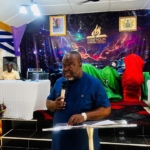
The Obuasi East Municipal Assembly has recorded an impressive milestone in its revenue mobilisation efforts, exceeding its Internally Generated Fund (IGF) target for the first five months of 2025.
The Assembly generated more than GH₵1 million, surpassing the projected target of GH₵915,420.00 for the period between January and May 31, 2025.
Mr. William Kofi Adzowu, the Municipal Chief Executive (MCE), delivering his sessional address at the general assembly meeting, commended the Assembly’s revenue unit for their dedication and efficiency, which he said contributed significantly to the achievement.
“This is a remarkable improvement in revenue mobilisation.
It demonstrates the effectiveness of the prudent and pragmatic measures we have put in place,” he stated.
Mr. Adzowu cited key revenue sources such as property rates, market tolls, building and development fees, as well as sand and stone royalties, as major contributors to the revenue performance.
He noted that, while it was an encouraging outcome, there was still room for improvement in other areas of revenue generation.
The MCE also used the occasion to brief Assembly Members on key national flagship programmes being pursued by the government, including the 24-Hour Economy and the Feed Ghana Programme (FGP).
Touching on the 24-Hour Economy initiative, which was officially launched by President John Dramani Mahama on July 3 in Accra, Mr. Adzowu said the programme aimed to boost economic growth, increase employment opportunities, and enhance exports for foreign exchange.
He disclosed that as part of local efforts to support the initiative, the Assembly planned to relocate wood sellers from their current location to the newly developed Boete Industrial Park.
The vacated area will then be redeveloped into a modern, 24-hour market equipped with parking spaces and lorry terminals to improve access, reduce the cost of doing business, and make the municipal economy more dynamic.
To facilitate this move, the Assembly has proposed the construction of nine sheds in phases at the new site.
The project will also include auxiliary facilities such as a health centre, police station, school, and a lorry terminal to serve the relocated traders and surrounding communities.
Touching on the Feed Ghana Programme, the MCE described it as a strategic agricultural intervention aimed at transforming Ghana’s agriculture sector.
The programme seeks to boost domestic production, reduce import dependency, enhance food security, and create sustainable employment.
He noted that the Assembly’s Agriculture Department was currently registering farmers and sensitising them on the programme to ensure full participation.
“The programme presents an opportunity to create jobs and wealth, improve food and nutritional security, and add value to agricultural production,” the MCE emphasised.
